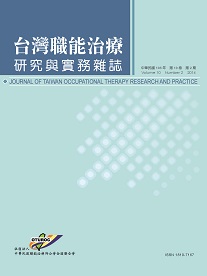Journal of Taiwan Occupational Therapy Research and Practice

半年刊,正常發行
自我效能對個人影響甚鉅,包含:自我照顧能力、面對生活事件的因應和調適能力,本研究之目的:主要運用自我效能團體,施行Bandura 所提出的增進自我效能方法(包含:行為表現結果、替代性經驗、口頭說服、生理激勵),讓精障者有機會探索與認識自我,瞭解自己的優勢能力,教導他們面對生活、人際以及壓力情境問題之解決策略,增進他們的自我效能和社會功能。方法:本研究對象為16 位慢性精障者,參與8 次之「自我效能」團體,每次團體進行100 分鐘(中間休息10 分鐘),於團體介入前後施測自我效能和社會功能量表,了解參與者的自我效能與社會功能變化;之後質性訪談5 位參與者,瞭解參與自我效能團體之想法與助益。結果:多數參與者在自我效能與社會功能分數有明顯進步或維持;參與訪談的成員在自我認識、人際互動和生活事件之問題解決能力均有顯著成長與改變。結論:自我效能團體介入能改善慢性精障者的自我效能與社會功能。
Objective: This study employed self-efficacy groups for people with chronic mental illness to have the opportunity for exploration and self-understanding, to understand their own strengths; to teach them strategies for facing life, interpersonal and problem solving skills under stressful situations; and to enhance their self-efficacy and social functions. Methods: The study was based on qualitative and quantitative research methods. The pre-test and posttest were done with the self-efficacy and the social function scales, to understand the variance of their self-efficacy and social function. Also, the five members participated voluntarily for this research interview. Results: Before and after using the nonparametric analysis of self-efficacy and social function, test results were significant in terms of self-efficacy, although social function did not reach significance. Five participating interviewees showed the growth and changes in self-awareness, interpersonal skills, and problem-solving aspects of life events. Conclusion: Participation in the self-efficacy group improved people with mental illness selfefficacy.












